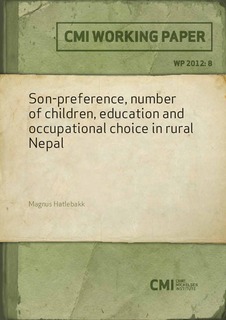Son preference, number of children, education and occupational choice in rural Nepal
Working paper
Permanent lenke
http://hdl.handle.net/11250/2475384Utgivelsesdato
2012-10-01Metadata
Vis full innførselSamlinger
- Publications [1488]
Originalversjon
Bergen: Chr. Michelsen Institute (CMI Working Paper WP 2012:8) 26 p.Sammendrag
A unique family survey was conducted in Nepal to investigate the economic consequences of having a first-born girl. Women get more children, but we find no causal effect of number of children on economic outcomes. But independently of the number of children there is a positive effect on boys' education of having a first born sister, who presumably takes care of household work so the boys can focus on school. This indicates a stronger son-preference in Nepal than what is found in studies from neighboring countries.
